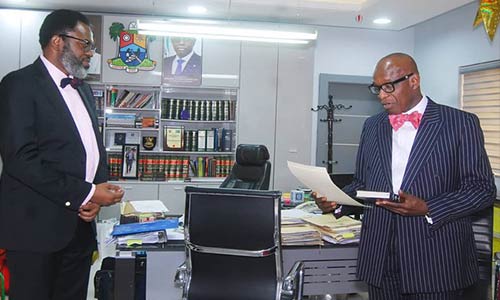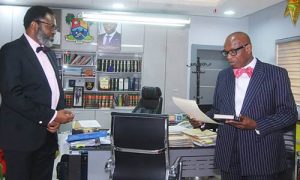
LAGOS STATE INTENSIFIES EFFORTS TO TRANSLATE LAWS INTO YORUBA

… Reaffirms Commitment To Legal Accessibility and Inclusion
The Lagos State Government has reiterated its commitment to translating state laws into Yoruba to enhance legal accessibility and inclusivity. This was disclosed on Wednesday during a Stakeholders’ Meeting to disseminate the outcome of the 2024 People’s Perception Survey on the translation of state laws into Yoruba organised by the Lagos State Law Reform Commission (LAWRECOM) in conjunction with the Bureau of Statistics, Ministry of Economic Planning and Budget, held at the STO Resource Centre, Debt Management Office, Ikeja.
Speaking at the event, the Executive Secretary of LAWRECOM, Mrs. Oluyemisi Adefoluke Ogunlola emphasised the importance of making legal information accessible to the general public, noting that Lagos is a predominantly Yoruba-speaking state with a population exceeding 25 million.
She explained that the current legal framework, codified exclusively in English, poses challenges to voluntary compliance and civic engagement for many residents who struggle to fully comprehend legal texts.
“Our legal system, like that of the Federal Government, has traditionally been codified exclusively in English. However, a significant portion of our people struggle to fully comprehend legal texts written in English, making voluntary compliance and civic engagement more difficult,” she stated.
Highlighting the socio-economic implications, Mrs. Ogunlola noted that over 82% of Lagosians operate within the informal sector, where Yoruba is the dominant language of communication.
She explained that the limited understanding of legal provisions has contributed to challenges in business transactions, dispute resolution, and governance participation. She maintained that translating laws into Yoruba would democratize legal information, promote legal literacy, and foster greater inclusion in governance.
Mrs. Ogunlola further highlighted that translating Lagos State laws into Yoruba would enhance public awareness and compliance with legal obligations, noting that when people understand the laws in a language they are comfortable with, they are more likely to adhere to regulations and avoid legal pitfalls.
“When citizens are well-informed about their rights and responsibilities, it minimizes inadvertent violations and reduces the burden on law enforcement agencies”, she stated.
She added that the initiative would enhance civic participation and engagement, as citizens would better understand the laws governing them, leading to more active participation in governance processes such as public hearings, community dialogues, and policy advocacy.
The Executive Secretary commended the Lagos State Government under the leadership of Governor Babajide Olusola Sanwo-Olu for championing the initiative, as well as the Lagos State House of Assembly for promoting the use of Yoruba in official discourse.
She called on stakeholders to remain actively involved in the next phase of the project and to support the widespread adoption of the translated laws.
Earlier in her address, the Yoruba Consultant, Lagos State House of Assembly, Dr. Adejoke Deborah Olajide pointed out that translating the law into Yoruba would foster a better understanding of the law and promote a culture of accountability and respect for the rule of law.
She said the initiative is not only about legal accessibility but also about promoting cultural heritage, as it would help to modernize Yoruba by incorporating contemporary legal terminologies, thereby enriching the language and keeping it relevant for future generations. Mrs. Olajide noted that this effort would encourage academic research and educational programmes focused on law and governance in Indigenous languages.
She emphasised that the initiative would enhance legal empowerment and access to justice, particularly for vulnerable groups such as women, artisans, market traders, and the elderly, who are predominantly Yoruba-speaking.
She stated that translating laws into Yoruba would empower these groups by providing them with the knowledge needed to protect their rights and seek redress when necessary.
She also noted that the newly approved National Language Policy underscores the pivotal role of indigenous languages as tools for effective communication and cultural preservation, hence the translation of state laws into Yoruba is pertinent for better understanding, as ignorance of the law would not be an excuse.
The Assistant Secretary-General, Lagos State Community Development Advisory Council, Mr. Bodurin Mendes, on his part, said the initiative is a milestone achievement that would bring development to the grassroots and enable them to understand the law better.
He noted that the outcome of the 2024 survey on people’s perception of the initiative showed that a large percentage of the population wants the laws translated for better understanding, adding that the state government has demonstrated democracy by seeking public opinion rather than imposing the translation of the laws.
He, therefore, urged the participants to intensify efforts in sensitising their communities on the importance of translating the laws into their native language.
The event had in attendance His Royal Majesty, the Adeboruwa of Igbogbo, Oba Kamorudeen Kasali; His Royal Majesty, the Olu of Iwa and Apapa Kingdom, Oba Maroof Oyekunle Atanda and other stakeholders in the legal sector.
![]()
